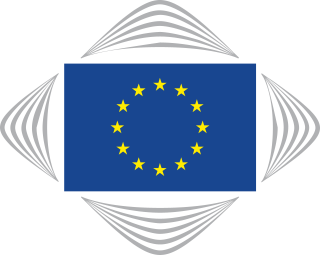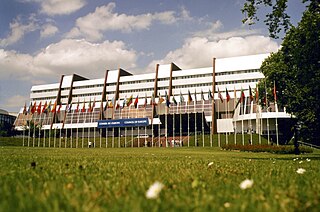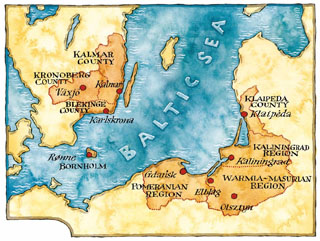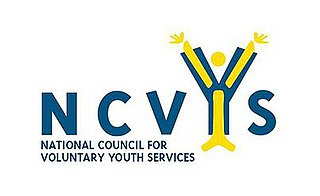
The European Union created a Committee of the Regions to represent Regions of Europe as the layer of EU government administration directly below the nation-state level. The Committee has its headquarters in Brussels.

The European Committee of the Regions (CoR) is the European Union's (EU) assembly of local and regional representatives that provides sub-national authorities with a direct voice within the EU's institutional framework.
The European Geography Association, abbreviated EGEA, is a European network of geography students and young geographers, with the intention of exchanging geographical knowledge. To achieve this, the entities of EGEA organize congresses, exchanges between the entities, national weekends, excursions, and a scientific magazine is published. The main communication platform is the website.

The European Scout Region is one of six geographical subdivisions of the World Organization of the Scout Movement, headquartered in Geneva, Switzerland, with a satellite office in Brussels, Belgium.

The United Nations Permanent Forum on Indigenous Issues is the UN's central coordinating body for matters relating to the concerns and rights of the world's indigenous peoples. "Indigenous person" means native, original, first people and aboriginal. There are more than 370 million indigenous people in some 70 countries worldwide. The forum is an advisory body within the framework of the United Nations System that reports to the UN's Economic and Social Council (ECOSOC). The first indigenous to be elected to office at a United Nations meeting was Chief Ted Moses of the Grand Council of the Crees in Canada, in 1989.

The British Youth Council, known informally as BYC, is a UK charity that works to empower young people and promote their interests. The national charity, run by young people, exists to represent the views of young people to government and decision-makers at a local, national, European and international level; and to promote the increased participation of young people in society and public life. It is partly funded by the Department for Digital, Culture, Media and Sport and UK Parliament.

The Congress of Local and Regional Authorities is the pan-European political assembly representing local and regional authorities from the forty-seven member states of the Council of Europe. Its role is to promote local and regional democracy, improve local and regional governance and strengthen authorities' self-government, according to the principles laid down in the European Charter of Local Self-Government. It is made up of two chambers, the Chamber of Local Authorities and the Chamber of Regions and holds its plenary sessions twice a year at the Palace of Europe in Strasbourg, where its permanent Secretariat is located.

The European Youth Forum is an international non-profit association and serves as a platform and advocacy group of the national youth councils and international non-governmental youth organisations in Europe. It strives for youth rights in international institutions such as the European Union, the Council of Europe, and the United Nations.

The International Lesbian, Gay, Bisexual, Transgender, Queer & Intersex Youth and Student Organisation (IGLYO) is an international LGBTQI organisation that was created in 1984 as a reaction to the need for better cooperation among regional, local and national LGBTQI youth and student organisations.
FEANTSA, the European Federation of National Organisations working with the Homeless, is the only major European network that focuses exclusively on homelessness at European level and receives financial support from the European Commission for the implementation of its activities. FEANTSA also works closely with other EU institutions, and has consultative status at the Council of Europe and the United Nations.
The Assembly of European Regions (AER) is the largest independent network of regions in wider Europe. Bringing together regions from 35 countries and 15 interregional organisations, AER is a forum for interregional cooperation.
The North–South Centre, officially the European Centre for Global Interdependence and Solidarity, is a Partial Agreement — of the Council of Europe, the oldest political organisation of European states.
Open Ukraine Foundation is a nonpartisan international philanthropic foundation established in July 2007 by Arseniy Yatsenyuk and Zbigniev Drzymala to support public diplomacy and raise the profile of Ukraine internationally. Also for strengthening and development of Ukraine’s reputation in the world.
International Forestry Students’ Association or IFSA is a non-political, not for profit organisation of tertiary-level forestry students around the world. Approximately 10,000 forestry and related forest science students are either directly or indirectly represented, with about 120 Local Committees in over 50 countries.

The Union for the Mediterranean is an intergovernmental organization of 42 member states from Europe and the Mediterranean Basin: the 27 EU member states and 15 Mediterranean partner countries from North Africa, Western Asia and Southern Europe. It was founded on 13 July 2008 at the Paris Summit for the Mediterranean, with an aim of reinforcing the Euro-Mediterranean Partnership (Euromed) that was set up in 1995 as the Barcelona Process. Its general secretariat is located in Barcelona, Spain.

Euroregion Baltic(ERB) is an institutionalised form of cross-border cooperation in the south-east of the Baltic Sea Region, consisting of eight regions of Denmark, Lithuania, Poland, Russia, and Sweden.
ARLEM is a permanent, joint assembly, bringing together local and regional authorities from the three shores of the Mediterranean. This assembly is designed to provide an institutional framework to bring together CoR members and representatives of European associations involved in Euro-Mediterranean co-operation with their counterparts from the Mediterranean partners in a permanent joint body.

The National Council for Voluntary Youth Services (NCVYS) was a membership network of over 200 voluntary and community organisations, as well as local and regional networks, that work with and for young people across England. The organisation closed in 2016. For 80 years, NCVYS acted as an independent voice of the voluntary and community youth sector, working to inform and influence public policy, supporting members to improve the quality of their work, and also raising the profile of the voluntary and community sector's work with young people.

The European Alliance of Cities and Regions for Roma Inclusion is an initiative from the Congress of Local and Regional Authorities of the Council of Europe. The Alliance currently gathers 130 Cities and Regional authorities from 29 countries.

Andrey Grishev Novakov is a Bulgarian politician from the GERB political party and a member of the European parliament (MEP) as part of the political group of the European People's Party EPP. He is the youngest Member of the European Parliament and one of the youngest in the history of this institution.













